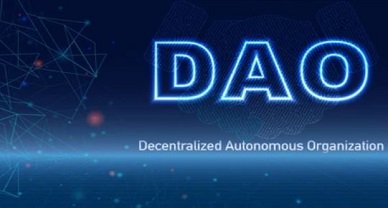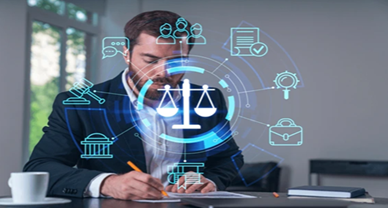Can DAOs Crack their Identity in India?
Introduction To Dao
In the interaction between technology and the concept of human decentralised autonomy, the term ‘blockchain’ has become synonymous to defy the traditional methods of centralised governance. This centralised system takes the form of many scenarios; whether it being constituted as money being controlled by the government or business being restricted to a handful of members in a boardroom.
This defiance to traditional measures of operation gives birth to new ideas like Decentralised Autonomous Organisations or popularly known as DAO’s. DAO’s can be simply defined as a collective association of people who come together for a shared purpose or goal (which may/may not change in the future) on the blockchain network and decide on important aspects of the goal like managing governance of goods on the network, how specific contracts would be executed based on rules imbibed in codes, regulation of other parts like information management in the network and how decentralised financing would work in the blockchain network etc[i]. Simply said, it is a tight knit community of people who have voting rights when it comes to amendments of rules of the organization which are themselves in the form of code on the blockchain network.
Instead of the regular dividend or share system that one might be familiar with in the company atmosphere, a member here is incentivized by providing tokens which can be redeemed for a fixed amount of cryptocurrency in the future[ii] or held to exercise voting rights. This ensures that the volumetric bias for personal gain is kept in check and main priority is provided towards community goal since gains in the system are provided on an individual basis of service and not based on scales of profit. Additionally, if the person acts in bad faith even after holding a significant amount of tokens, he runs the risk of losing investment as well as voting rights. DAOs stand by the statement that, “code runs the board” rather than the other way around since the code is open source i.e. can be seen by anyone, is executed by efficient smart contracts and finds its way around the archetypal company management style.[iii]
These new organisations quench the thirst of community ownership and free will voting of all members to stop bias and profit maximize intention. The idea of a DAO emerges from the simple fact that the users are the only beneficiaries of the content they create under the new web 3.0 mechanism (User content stored in a block chain data and DAOs managing the rules of these chains) in contrast to the ownership by a single entity like meta under web 2.0.[iv](user content stored on centralised servers of the company).[v]
[Image Sources: Shutterstock]
A stark comparison of DAO’s can be made to the fictional world of John Wick’s continental where payments are made by gold coins(similar to tokens here) and the assassination records are posted on a decentralised single chart wherein old and new targets are both present with their hit value(similar to how both previous member codes and new member codes are present when a new block gets added to the chain.) Just like how the highest authority community members form the rules of killing or not killing a person, typically referred in the movie as the ‘High Table”, the DAO operate in a similar fashion with most of the contracts being executed automatically upon fulfilment of some objective or rules and power residing with all members depending on the number of tokens they hold who make such objectives and rules.
India And The Matrix Identity Of Dao
DAOs are similar to traditional companies in that they hold assets, raise funds, and undertake other business activities. However, unlike traditional companies, DAOs do not have a recognized identity of artificial persons provided by law under the existing legal structure in most jurisdictions[vi]. The same issue arises with the categorisation of DAO under the Indian Scheme of laws. Currently there are only a handful of DAO organisations operating in India. Some of them are : RAW studio, Wall.app, Push Protocol etc.[vii]
The problem arises when we contemplate upon a situation wherein a DAO has to be made liable for its actions in accordance with penal provisions. It is at this junction that the dilemma steps in: whether to go the traditional route of lifting of corporate veil and make everyone liable due to the lucrative instance of full community voting or to only make the majority token holders liable.[viii]
Furthermore, the issue of registration of DAO’s is a complicated scenario wherein most organisations have opted to be registered as LLC for lawful purposes to merge the online with the offline.[ix] However, their way of governance, diversity in operations and discretion through voting of all make it difficult whether the Companies Act 2013 would suffice or Section 4 of the Indian Partnership Act 1932[x] needs to step in. It can be seen that DAO’s working is an abstract mixture of both partnership and company law, which is why specific rules are needed for governance rather than conventional methods of pasting the LLC tag.
Dao’s Tokens And Security Issue
DAO’s tokens present a whole new challenge for the legislation of rules for securities exchange authorities like SEBI in India. In the global perspective, these tokens have had a mixed response of being perceived in multiple facets of investment, property and even money for the financial regulators who have kept a strong eagle like watch on them to prevent misuse.[xi] While SEBI is aware that in the international playing field, SEC has declared DAO provided tokens as securities under their ambit[xii], the concern arises from the fact that neither the DAO tokens have been granted any mention under the Section 2(h) of Securities Contracts (Regulation) Act, 1956[xiii] , nor has SEBI taken a Suo motu step to bring them under their jurisdiction through Section 11 of the Securities And Exchange Board Of India Act, 1992[xiv].
On a speculative reading, DAO tokens present themselves as a valid form of security which fulfil the criteria of an investment scheme laid down in the landmark case of SEC v. W. J. Howey co i.e.[xv]
“The test is whether the scheme involves an investment of money in a common enterprise with profits to come solely from the efforts of others. If that test be satisfied, it is immaterial whether the enterprise is speculative or non-speculative or whether there is a sale of property with or without intrinsic value”
Interestingly, the landmark cases of Sahara India Real Estate v. SEBI[xvi] and Bhagwati Developers Pvt. Ltd. v. Peerless General Finance [xvii]can constitute as a valid approach for SEBI to look at DAO issued tokens as valid forms of security since the underlying principles of the above case also stem from W.J Howley case; to bring an all-inclusive approach to all securities dealing with public at large.[xviii]
While every DAO member has voting power and participates in decision-making, arguing that their “profit comes solely from others” ignores the active role they play in defining the DAO’s success. Ownership of governance tokens entitle members to more than simply a passive share of earnings; it also enables them to contribute their talents, expertise, and voting rights to influence the DAO’s strategy, investments, and resource allocation.
Conclusion
The latest turn of events presents a conundrum when it comes to dealing with DAO crypto tokens. In the latest case of SEC v. Ripple[xix] (June 2023), it was held by the United States Southern District Court of New York that cryptocurrency is regarded as a security only when it finds itself being sold to institutional investors and not upon selling to public on an exchange. This is both major setback and a minor victory for regulatory authorities around the world who can look at this judgement as a starting step for DAO token regulation.
Section 2(h) of Securities Contracts (Regulation) Act, 1956 also include the words, ‘any incorporated company or other body corporate’ which means that only if DAO registers itself as a company, the provisions of the above law will apply. However, DAO’s legal entity status itself remains in a perplexed state[xx] when not registered as a LLC.[xxi]. In that scenario, even SEBI would fail to bring it within the ambit of securities. This is a major flaw which needs to be addressed.
Thus, the future of how DAO’s identity would be perceived in India is left to the legislature, who can draft appropriate committees through experts and reach an expert opinion as to how the new age tech driven organisations would find their governance pathway in India.
Author: Harjas Singh Gulati, in case of any queries please contact/write back to us at support@ipandlegalfilings.com or IP & Legal Filing
[i] Admin, Decentralized Autonomous Organizations (DAOs): A Digital Revolution in the Corporate Realm, NLIU CELL FOR STUDIES IN INTELLECTUAL PROPERTY RIGHTS, (17th September, 2020), https://csipr.nliu.ac.in/technology/decentralized-autonomous-organizations-daos-a-digital-revolution-in-the-corporate-realm/
[ii] Gail Weinstein, Steven Lofchie, and Jason Schwartz, Fried, Frank, Harris, Shriver & Jacobson LLP, A Primer on DAOs, HARVARD LAW SCHOOL FORUM ON CORPORATE GOVERNANCE, (18th December 2018), https://corpgov.law.harvard.edu/2022/09/17/a-primer-on-daos/
[iii] MoreReese and DJ, What are Governance Tokens? How Token Owners Shape a DAO’s Direction, DECRYPTU, (30th March 2022), https://decrypt.co/resources/what-are-governance-tokens-how-token-owners-shape-dao
[iv] OODLES BLOCKCHAIN, https://blockchain.oodles.io/blog/combination-metaverse-and-dao/ , (8th October 2022)
[v] Id
[vi] Leo Henkels, Are DAOs Legal? Exploring DAO Legal Issues and Regulatory Challenges, MIDAO, (2022) https://www.midao.org/blog-posts/are-daos-legal-exploring-dao-legal-issues-and-regulatory-challenges
[vii] F6S, https://www.f6s.com/companies/decentralized-autonomous-organization-dao/india/co, 18th December 2023
[viii] Casey Joley, Can a DAO license its intellectual property to other parties?, WEB3LEX, (18th December 2023) https://www.web3lex.io/cpt-knowledge-base/can-a-dao-license-its-intellectual-property-to-other-parties/
[ix] Supra n. 1
[x] Indian Partnership Act, 1932, § 4, No.9, Acts of Parliament, 1932 (India)
[xi] Alex Palmer, Are DAO tokens securities according to the SEC?, MEDIUM, (20th September 2022), https://medium.com/@ThatAlexPalmer/are-dao-tokens-securities-according-to-the-sec-b817009f5f1d#:~:text=An%20investment%20DAO’s%20%E2%80%9Cgovernance%20token,and%20membership%20tokens%20are%20securities.
[xii] SEBI BULLETIN Vol 15, No.8 , (August 2017), https://view.officeapps.live.com/op/view.aspx?src=https%3A%2F%2Fwww.sebi.gov.in%2Fsebi_data%2Fcommondocs%2Foct-2017%2Fsebibulletindocaugust_p.docx&wdOrigin=BROWSELINK
[xiii] Securities Contracts (Regulation) Act, 1956, §2(h), No.42, Acts of Parliament, 1956 (India)
[xiv] The Securities And Exchange Board Of India Act, 1992, §11, No.15, Acts of Parliament, 1956 (India)
[xv] SEC v. W.J. Howey Co., 328 U.S. 293 (1946)
[xvi] Sahara India Real Estate v. SEBI , 2012 (4) CompLJ 1 (SC)
[xvii] Bhagwati Developers Pvt. Ltd. v. Peerless General Finance, 2013 COMPLJ CAL 3 257
[xviii] Guest, Prospects of Regulation of Initial Coin Offerings by SEBI, INDIACORPLAW, (20th August 2018), https://indiacorplaw.in/2018/08/prospects-regulation-initial-coin-offerings-sebi.html
[xix] SEC v. Ripple, 20 Civ. 10832 (AT)
[xx] Marianna Ryan, Ownership of IP rights by DAOs – the future is nigh?, IPKITTEN BLOGPOST, (31st August 2022), https://ipkitten.blogspot.com/2022/08/guest-post-ownership-of-ip-rights-by.html
[xxi] Supra n.2



